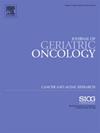痴呆症对非小细胞肺癌患者出院时功能衰退的影响:回顾性队列研究
IF 3
3区 医学
Q3 GERIATRICS & GERONTOLOGY
引用次数: 0
摘要
简介:入院治疗通常会导致痴呆症患者的功能下降,但有关住院期间癌症治疗对这一人群的影响的证据却很有限。我们旨在研究非小细胞肺癌(NSCLC)患者在接受癌症治疗后痴呆与功能下降之间的关系:本研究从日本 366 家急诊医院的数据集中收集了 30213 名 65 岁或以上的非小细胞肺癌住院患者。研究的主要结果是出院时的日常生活能力(ADL),采用巴特尔指数(Barthel Index)进行评估,总分从 0 到 100 分不等;次要结果是住院时间。我们在反事实框架内使用 g 公式法和直接反事实归因法对癌症治疗进行了因果中介分析。根据 100 个自举样本计算出偏差校正和调整后的 95% 置信区间 (CI)。痴呆状态作为暴露因子,入院时的 ADL 评分作为中介因子,出院时的 ADL 评分作为结果因子。入院时测量的协变量用于调整痴呆状态。按包括手术在内的治疗组进行分组分析:结果:与未患痴呆症的NSCLC患者相比,无论入院时的ADL评分如何,痴呆症患者在大多数癌症治疗中出院时的ADL评分都较低。与没有痴呆症的患者相比,接受化疗的痴呆症患者住院时间延长了2.90天(95 % CI,1.27至4.52),出院时的ADL评分也较低(-9.77 [95 % CI,-12.55至-7.00])。同样,与没有痴呆症的患者相比,接受放射治疗的痴呆症患者出院时的ADL评分较低(-15.06 [95 % CI, -19.59 to -10.54]),住院时间则没有差异(-0.54 [95 % CI, -2.84 to 1.75]天)。在调整了潜在的混杂因素后,从总效应中也观察到了类似的结果:讨论:合并癌症和痴呆症的患者在接受各种癌症治疗后出院时的ADL评分一直较低。了解痴呆症对功能衰退的影响有助于为NSCLC患者的住院治疗做出最佳治疗选择。本文章由计算机程序翻译,如有差异,请以英文原文为准。
Effects of dementia on functional decline in patients with non-small cell lung cancer at discharge from acute care hospitals: A retrospective cohort study
Introduction
Hospital admissions often result in functional decline for patients with dementia, yet evidence on the impact of cancer treatments in this population during hospitalization is limited. We aimed to examine the association between dementia and functional decline after cancer treatment in patients with non-small cell lung cancer (NSCLC).
Materials and Methods
A total of 30,213 patients aged 65 years or older hospitalized for NSCLC treatment, from a dataset of 366 acute care hospitals in Japan, were eligible for this study. The primary outcome was activities of daily living (ADL) at discharge, assessed using the Barthel Index, with a total score ranging from 0 to 100, and the secondary outcome was the length of hospital stay. We conducted causal mediation analysis by cancer treatment within a counterfactual framework using the g-formula approach with direct counterfactual imputation. Bias-corrected and adjusted bootstrapped 95 % confidence intervals (CIs) were calculated based on 100 bootstrap samples. Dementia status served as the exposure, ADL scores at admission as the mediator, and ADL scores at discharge as the outcome. Covariates measured at admission were used to adjust for dementia status. Subgroup analyses were performed by treatment group including surgery.
Results
Compared with patients with NSCLC who did not have dementia, those with dementia exhibited lower ADLs at discharge across most cancer treatments, regardless of ADL scores at admission. Patients with dementia who underwent chemotherapy had prolonged hospital stays of 2.90 days longer (95 % CI, 1.27 to 4.52) and lower ADL scores at discharge than their counterparts without dementia (−9.77 [95 % CI, −12.55 to −7.00]). Similarly, patients with dementia who received radiotherapy experienced lower ADL scores at discharge compared with those without dementia (−15.06 [95 % CI, −19.59 to −10.54]), with no difference in the length of hospital stay (−0.54 [95 % CI, −2.84 to 1.75] days). Similar findings were observed from the total effects after adjusting for potential confounders.
Discussion
Patients with comorbid cancer and dementia consistently displayed lower ADL scores at discharge following various cancer treatments. Understanding the effects of dementia on functional decline may aid in making optimal treatment choices for inpatient care for patients with NSCLC.
求助全文
通过发布文献求助,成功后即可免费获取论文全文。
去求助
来源期刊

Journal of geriatric oncology
ONCOLOGY-GERIATRICS & GERONTOLOGY
CiteScore
5.30
自引率
10.00%
发文量
379
审稿时长
80 days
期刊介绍:
The Journal of Geriatric Oncology is an international, multidisciplinary journal which is focused on advancing research in the treatment and survivorship issues of older adults with cancer, as well as literature relevant to education and policy development in geriatric oncology.
The journal welcomes the submission of manuscripts in the following categories:
• Original research articles
• Review articles
• Clinical trials
• Education and training articles
• Short communications
• Perspectives
• Meeting reports
• Letters to the Editor.
 求助内容:
求助内容: 应助结果提醒方式:
应助结果提醒方式:


